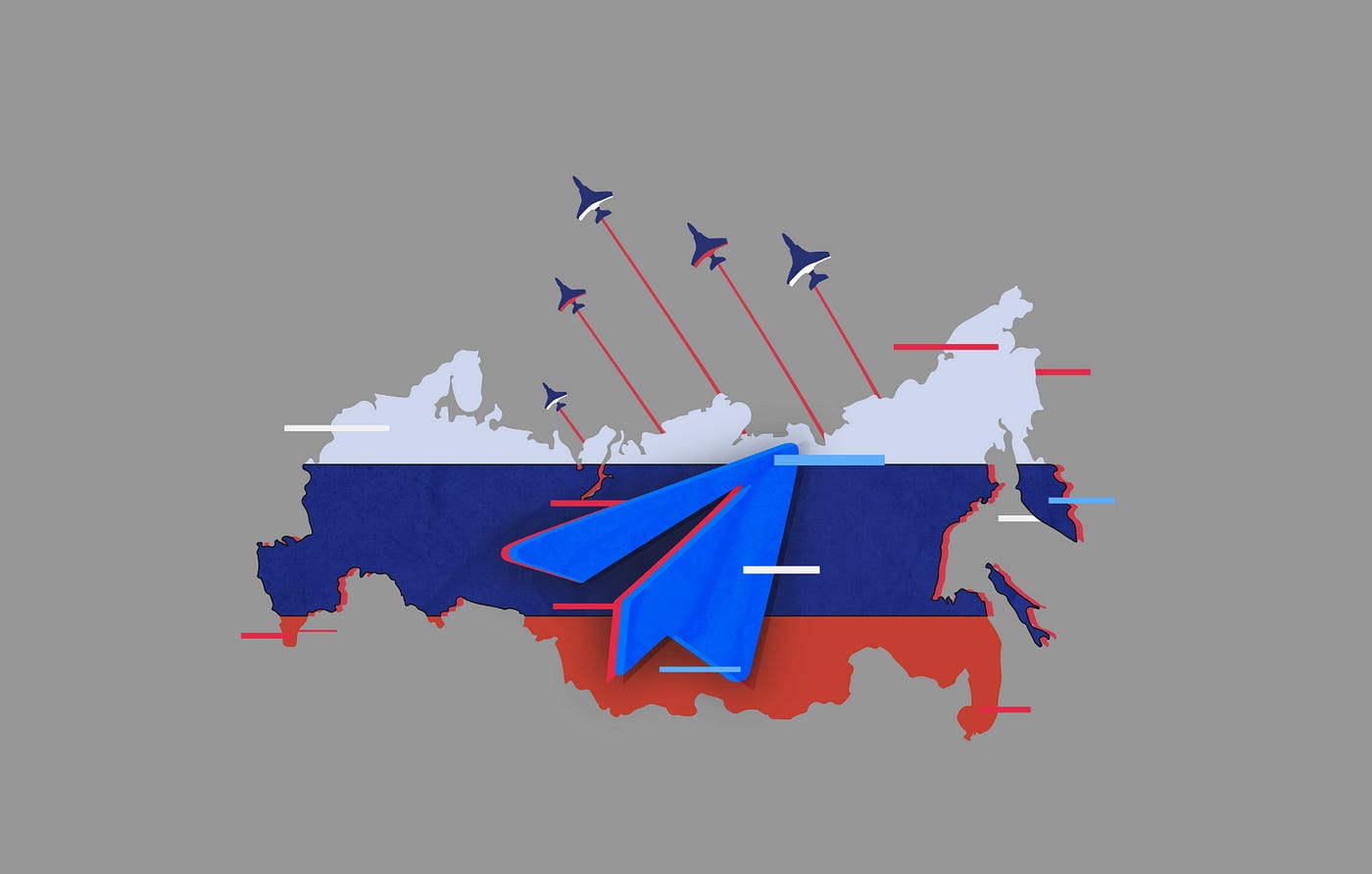Pro-Russian Telegram Channels Amplify Anti-UN Sentiments
Pro-Russian Telegram operatives wage relentless disinformation campaigns against UN peacekeepers in Mali, DRC, and CAR.
Originally published in African Digital Democracy Observatory in collaboration with our friends at Code for Africa.
Pro-Russian operatives have orchestrated a relentless disinformation campaign on Telegram and other dark messaging platforms against the UN peacekeeping missions in Mali, the Democratic Republic of the Congo (DRC) and the Central African Republic (CAR).
These coordinated anti-UN campaigns target the United Nations Multidimensional Integrated Stabilization Mission in Mali (MINUSMA), the United Nations Organization Stabilization Mission in the Democratic Republic of the Congo (MONUSCO), and the United Nations Multidimensional Integrated Stabilization Mission in the Central African Republic (MINUSCA). The campaigns are a form of digital warfare aimed at undermining their legitimacy and inflaming local sentiments against these missions.
These dark social channels are also breeding grounds for information manipulation, which aims to erode trust in the capacity of UN missions to fulfill their mandates.
Such targeted, coordinated influence and disinformation campaigns present a complex challenge to the UN’s operational capabilities and the broader perception and effectiveness of international peacekeeping and humanitarian efforts.
The following are the main findings of the investigation:
Dark social media platforms like Telegram and WhatsApp are integral. sources of information in Mali, the DRC, and CAR. For instance, several Telegram channels in Mali shared updates about the situation during the anti-MINUSMA protests. Telegram’s structure, with its end-to-end encryption, makes it attractive for spreading extremist views and disinformation. Updates shared by these Telegram channels invariably find their way onto mainstream social platforms like Facebook and Twitter, reaching a wider audience.
Key actors in the anti-UN Telegram campaigns have direct or indirect links to the Kremlin-backed Wagner Group or Russia. This includes actors such as Viktor Vasiliev, Artem Blinov, and Aleksandr Bovdunov.
Amplified narratives focus on undermining UN missions by portraying them as ineffective, corrupt, and complicit in crimes. They position Russian military involvement as a more effective and transparent alternative. An example of this was the narrative spread by the Telegram channel ‘Lay Low in Bangui’, which accused MINUSCA of arms trafficking in CAR. These messages are timed to coincide with significant events like pan-Africanist protests or military actions, amplifying their impact. For instance, posts about MINUSMA’s withdrawal from Mali were timed to coincide with rising regional tensions.
A key technique observed in the disinformation campaigns is the strategic cross-posting of content between various Telegram channels. This method reinforces and amplifies the reach of specific narratives. Other techniques include using multimedia content to attract higher engagement and posting content in local languages, ensuring the disinformation is contextually relevant and resonates more effectively with the intended audience.
A. Main Findings
Telegram and WhatsApp are easily accessible platforms that can rapidly disseminate information to a wide audience, making them ideal for spreading narratives quickly and widely. Telegram’s encryption also provides a degree of anonymity and security for users, which can appeal to actors wishing to spread disinformation without accountability. This aspect makes it challenging to counteract false narratives and misinformation on this platform. As a result, the information ecosystem in the Sahel region is increasingly vulnerable to manipulation, allowing entities like pro-Wagner and pro-Russian groups to shape public perception and sentiment about UN interventions effectively.
Below, we highlight the key actors identified during our investigation, the narratives they amplified, and the tactics and techniques they used to amplify the anti-UN narratives and disinformation content.
Based on the comprehensive investigation data, several key actors emerged as pivotal in the information manipulation campaigns targeting MINUSMA, MONUSCO, and MINUSCA with connections to Russia or the Wagner Group.
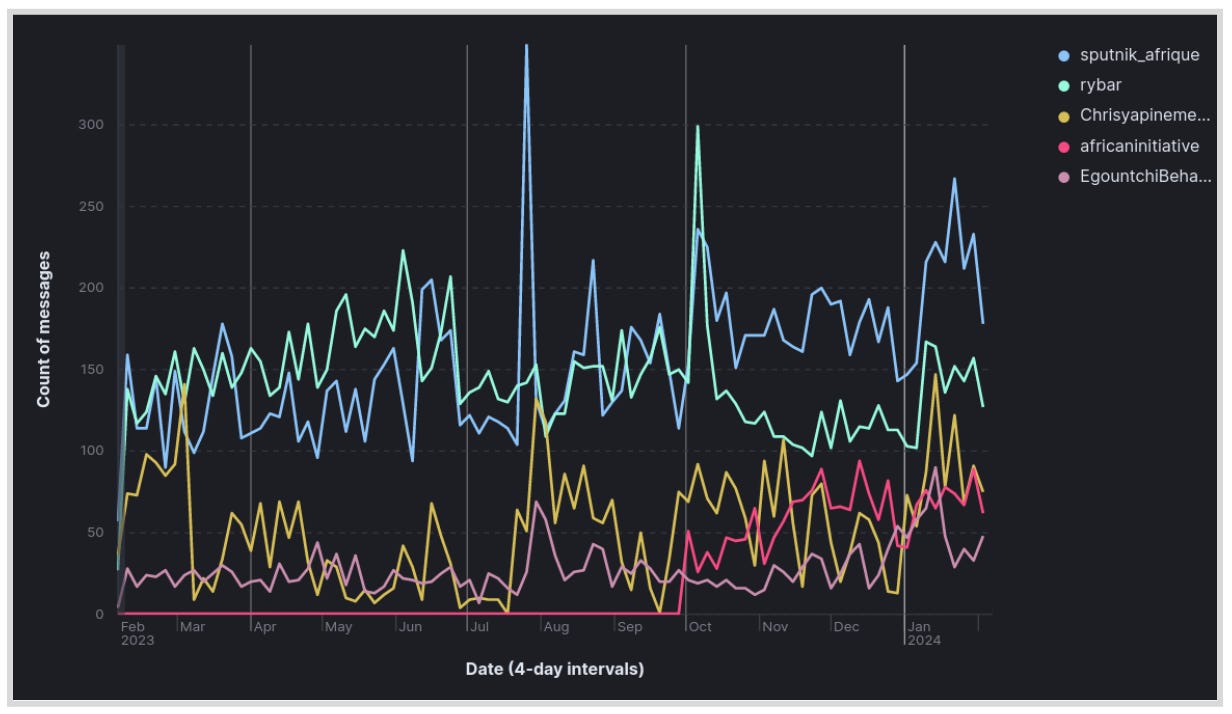
B. Amplified Narratives
The information manipulation campaigns targeting the missions in Mali, the DRC, and CAR have been amplifying several key narratives, which have been strategically chosen to advance Russia’s or Wagner’s interests in these regions. These narratives are effective for several reasons: they exploit existing frustrations and challenges in these countries, resonate with local sentiments, and are tailored to undermine trust in Western and UN entities while promoting Russian interests.
1. UN Missions’ Ineffectiveness and Corruption
A recurring theme across the campaigns is the portrayal of UN missions (MINUSMA, MONUSCO, and MINUSCA) as ineffective, corrupt, and involved in criminal activities. For instance, the Telegram channel ‘Fear and Loathing in Bamako’ accuses UN peacekeeping troops of serious crimes like aiding militants, smuggling weapons, and various types of violence. Such narratives undermine trust in UN missions, creating a vacuum that Russian military entities like Wagner or the Africa Corps could fill.
The key actors involved in amplifying this narrative include:
Artem Blinov, operates the Telegram channel ‘Fear and Loathing in Bamako’ (Страх и ненависть в Бамако), which focuses on African affairs.
On 07 July 2023, ‘Fear and Loathing in Bamako’ posted a message accusing UN peacekeeping forces of abusing their diplomatic immunity during their operations. According to the post, the forces are involved in the following crimes:
i. Aiding militants
ii. Smuggling weapons and drugs
iii. Hiding information about the real situation in the country
iv. Theft, racketeering, and robbery
v. Various types of violence (beatings, rape, including gang rape, and sexual slavery)
vi. Child molestation
The channel also posted about scandals surrounding the UN peacekeeping operations in Western Sahara (United Nations Mission for the Referendum in Western Sahara or MINURSO) and South Sudan (United Nations Mission for South Sudan or UNMISS). The channel regularly publishes unsubstantiated claims against MINUSMA, including one that falsely alleged the Malian authorities criticized MINUSMA for not adhering to its withdrawal schedule, thereby enabling jihadists to take control of certain parts of the country.
Nathalie Yamb is a Cameroonian-Swiss activist who runs the Telegram channel ‘La Dame de Sochi’. Her posts are anti-French and she has previously been labelled a Russian influencer for her continuous support for Russian operations in Africa. Yamb has repeatedly called for an end to French operations and UN missions in Africa, which she links together.
On 19 October 2023, Yamb posted a link to a video on her YouTube account on her Telegram channel. In the video, she falsely accused MINUSMA of collaborating with terrorists to aid France in gaining control over northern Mali. She alleges, without evidence, that this was a plan by MINUSMA and France to divide Mali to take control of northern Mali. She urged people in CAR and the DRC to observe and anticipate disastrous events during MINUSCA’s and MONUSCO’s departure from these countries, respectively. This video has been viewed 170,000 times on YouTube and has 16,600 interactions. The post itself received 40,000 views and 88 interactions on Telegram.
On X (formerly Twitter) and Telegram, Yamb has previously used hashtags such as #MinusmaDegage, #MinusmaDehors, #MonuscoDehors, and #MinuscaDehors to call for UN missions in Africa to be chased out. The French hashtags loosely translate to #MinusmaClear, #MinusmaOut, #MonuscoOut, and #MinuscaOut.
‘Lay Low in Bangui’ (Залечь на дно в Банги), a Telegram channel that shares updates on CAR in Russian, has consistently spread anti-MINUSCA narratives.
On 03 February 2023, ‘Lay Low in Bangui’ posted that a Central African Armed Forces (FACA) base in N’Délé, CAR, was attacked by a MINUSCA drone on t 21 January 2023. According to the post, this attack resulted in significant damage to a Mil Mi-8 helicopter and an aviation fuel depot. Although the channel did not state the source of its claim, it argued that MINUSCA attacked the base because it is stationed 1km from the FACA base. Without evidence or attribution, the channel claimed FACA established that the drone belonged to MINUSCA. The mission, however, pointed out that the attack was carried out by ‘other security personnel’, a reference to the Wagner Group. This post has so far received 731 views and 20 interactions.
In a post on 01 September 2023, the account accused MINUSCA of arms trafficking, basing its claim on the alleged arrest of a Mauritanian MINUSCA soldier by CAR’s security forces on 31 August 2023. The account claimed this was not an isolated incident and that other MINUSCA soldiers were involved in similar practices. So far, the post has been viewed 1,400 times and generated 13 interactions.
Similarly, on 03 November 2023, ‘Lay Low in Bangui’ posted unverified claims about a bandit attack in Oudda Jalle. The post claimed that the village chief, whose house was also attacked, sought refuge at the nearby MINUSCA camp but was chased away by the peacekeepers, who said the camp was not a refugee camp.
On 11 November 2023, ‘Lay Low in Bangui’ claimed that MINUSCA did not intervene during the unrest on 03 November 2023 in Paua, CAR. The post claimed that the unrest was quelled by Russian instructors in CAR and the national armed forces.
In the past, the account’s posts have accused MINUSCA of colluding with terrorists, hence hampering FACA’s efforts to maintain security in CAR.
2. Russian Instructors or Military Involvement as Better Alternative
The information manipulation and disinformation campaigns often position Russian military involvement as a more effective and transparent alternative to UN missions. The ‘Smile and Wave’ (Улыбаемся & Машем) channel suggested that Russia initiated MINUSMA’s exit from Mali, indicating that Russian military specialists might replace UN peacekeepers. This narrative aligns with Russia’s strategic interest in expanding its influence and military presence in Africa.
The key actors involved in amplifying this narrative include:
Aleksandr L. Bovdunov is a Russian researcher associated with the International Eurasian Movement. He has authored papers critical of UN missions and supportive of Russian-led initiatives. His academic work lends an intellectual veneer to the disinformation campaigns.
On 15 November 2023, the Commonwealth of International Security Officers (COSI or SOMB), a group whose members are Russian military instructors in CAR, shared a study by Bovdunov on its official Telegram channel. The study was called ‘SOMB and MINUSCA in the Central African Republic: the effectiveness of the realist and liberal peacekeeping paradigms’ and published in the Vestnik RUDN University International Relations journal. The post has been shared in six other Telegram channels, receiving 10,900 views and 103 positive interactions. The study has received no citations but has been uploaded to five academic article aggregation sites: ResearchGate, OUCI, Semantic Scholar, Scilit, and Cyberleninka.
The study compares the effectiveness of MINUSCA and Russian instructors in CAR, concluding that the Russian contingent is more effective in providing security and strengthening the state. Some Africans referenced in the study include previously flagged pro-Russian influencer Kémi Séba and CAR ambassador to Russia Leon Dodonu-Punagaza.
Bovdunov’s other published works on Africa include ‘The challenge of “decolonization” and the need for a comprehensive redefinition of neocolonialism’, ‘Eurasianism and pan-Africanism: common civilisational challenges and responses’, and ‘Russia and Africa: The contours of a multipolar world and the ideology of traditionalism’.
Viktor Vasiliev is a notable figure in these information manipulation efforts, running the Africa-focused Telegram channel ‘Smile and Wave’. His involvement in influencing Madagascar’s elections underscores his role in political manipulation. His channel has been instrumental in spreading false narratives against the UN missions, particularly in Mali, and promoting pro-Russian sentiments. Vasiliev’s content often credits Russia with influencing the withdrawal of UN missions and positions the Russian military as a logical successor.
On 29 August 2023, ‘Smile and Wave’ posted a video of Dmitry Polyansky, the first deputy permanent representative, speaking at a UN security council meeting. His speech was about the withdrawal of the UN peacekeeping mission from Mali. The post associated UN civil and military bureaucracy with a lack of transparency and corruption. The post also credited Russia with initiating MINUSMA’s exit from Mali and suggested that the next targets are the DRC and CAR.
Vasiliev has posted several essays on the geopolitics of Africa on his Telegram page, with a particular focus on the Sahel region.
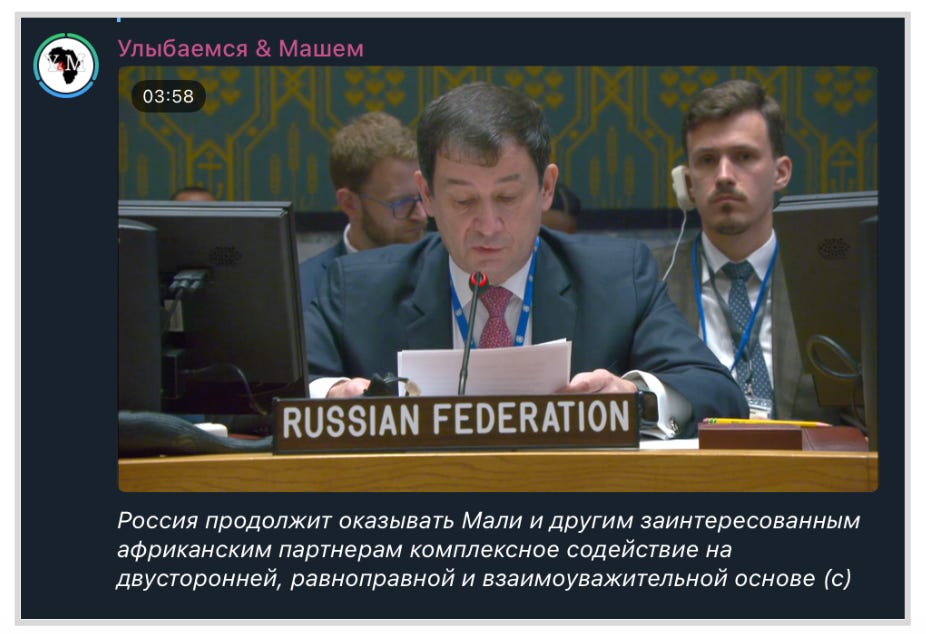
‘Rybar’ is a pro-Kremlin Telegram channel focusing on global politics and military updates. According to its website, the organization defends Russia’s interests, stating it ‘knows how to simply and effectively conduct an information war and show Russia from the right side’. Rybar has been active in spreading anti-UN sentiments, particularly regarding the different missions in Africa.
On 01 May 2023, in a post highlighting an anti-UN protest on 29 April 2023, Rybar claimed that MINUSMA had demonstrated passivity and an inability to resist militants’ expansion in Mali. Rybar added that, at that time, only Russian military specialists, including the Wagner Group, had provided tangible support to government troops in the fight against terrorists in Mali.
This narrative, portraying Russian troops as successful in countries where UN missions are based, while simultaneously presenting these missions as failures, becomes more popular when unrest occurs. For example, on 13 January 2023, Rybar reported on militant attacks in Mali and claimed that MINUSMA did not intervene and has always been passive. Rybar reiterated that the Malian government receives assistance only from Russian military specialists, including Wagner.
3. Alleged UN Mission Failures and Withdrawals
The campaigns focus on actual or alleged failures and the withdrawal of UN missions, framing them as victories for Russian diplomacy or military strategy. For example, the ‘Smile and Wave’ post about the UN withdrawing from Mali credits Russia with this development. Such narratives not only discredit the UN but also enhance the perceived effectiveness of Russian intervention.
Some of these channels have presented the UN missions as arms of imperialism and as part of a Western agenda. This was particularly evident after MINUSMA exited its Kidal camp in northern Mali on 31 October 2023. The mission’s withdrawal took place sooner than agreed, leading to the MINUSMA’s inability to complete a handover to the Malian army and Malian rebels seizing the camp. According to an article by Jeune Afrique published on the same day, MINUSMA blamed its accelerated exit on the deterioration of security in the northern region.
To amplify the incident, some of the monitored Telegram channels claimed that this confirmed MINUSMA’s complicity with the armed rebels in Mali. The posts claimed that they are terrorists, led by France and their allies, who take part in attacking populations. These posts, by channels like ‘Egountchi Bhanzin Officiel’, ‘Fear and Loathing in Bamako’, ‘Rybar’, and ‘Africa Initiative’, have since received a total of 345,900 views.
4. Russia’s Long-Term Commitment to Africa
The emphasis on Russia’s long-term commitment to Africa, as seen in the content of the Africa Initiative led by Artyem Kureev, is a narrative designed to build a positive image of Russia in Africa. This contrasts with the portrayal of Western or UN interventions as temporary or self-interested. The Africa Initiative, which describes itself as a ‘Russian news agency about events on the African continent’, has been central in driving African-related Russian propaganda, including accusing the US of conducting illegal experiments in Africa and testing its biological weapons under the guise of research and humanitarian projects.
The African Initiative publishes its content on its website and Telegram channel, which has 21,775 subscribers since its creation on 28 September 2023. However, the wider audience it enjoys on Telegram is not limited to its subscriber base. One of its most popular posts, about the activities of the Russian Orthodox Church in Burkina Faso, Mali, and Senegal, received more than 1.4 million views and 94 interactions after being forwarded to 12 public Telegram channels and groups and 2,100 Telegram accounts.
The Africa Initiative amplified the narrative that MINUSMA had vacated some of its bases in Mali earlier than scheduled, enabling the jihadists to take over those areas.
On 01 November 2023, the African Initiative posted a message claiming that jihadists had taken over the UN base in Kidal after the MINUSMA troops abandoned it instead of handing it over to the Malian army as part of the terms for the mission’s withdrawal from the country. The message received only 349 views as the channel was still nascent and had only 778 subscribers at the time. The post also shared the link to a similar publication on African Initiative’s website.
Subsequently, on 13 November 2023, the African Initiative posted another message claiming that the jihadists who had taken over the UN base in Kidal were using weapons abandoned by the UN peacekeepers when they withdrew from the base. The post cited a press release by the Malian army as the source. It received 1,100 views and 15 interactions.
5. Russian Defense and Diplomatic Successes
Channels like Rybar highlighted protests in Mali during which demonstrators waving Russian flags accused UN forces of failing to protect them from extremists. The channel’s broad reach and significant viewership make it a powerful tool for influencing public opinion.
On 03 January 2023, Rybar published a three-part series titled ‘Why UN peacekeeping missions are useless in Africa’. In the introduction to the series, Rybar claims that Western politicians are opposed to Russia’s presence in Africa because they believe the UN is already operational in these countries and that further foreign intervention is counter-productive. The series describes the different UN missions in Africa, when they were constituted, and what Rybar claimed to be their failures. These UN missions include MINURSO in Western Sahara; MINUSCA in CAR; MINUSMA in Mali; MONUSCO in the DRC; the United Nations Interim Security Force for Abyei (UNISFA) in Abyei, a contested area on the border between Sudan and South Sudan; and UNMISS in South Sudan. The series concludes by providing reasons for the alleged low effectiveness of UN representatives in these countries. Rybar points to corruption, arms smuggling, and a lack of motivation for UN troops to risk their lives. Rybar also argues that, despite these missions’ alleged failures, they are unlikely to end since, by their presence, the UN’s key Western donors continue to exercise control over local governments and authorities. It also alleged that Western companies continue to enrich themselves from minerals in these countries which in turn causes conflict and, thus, the need for funded missions. Rybar did not present evidence of Western countries exploiting the minerals of the countries where UN missions are deployed.
The series has since been shared with 110 other Telegram channels and groups and viewed ~1,082,000 times.
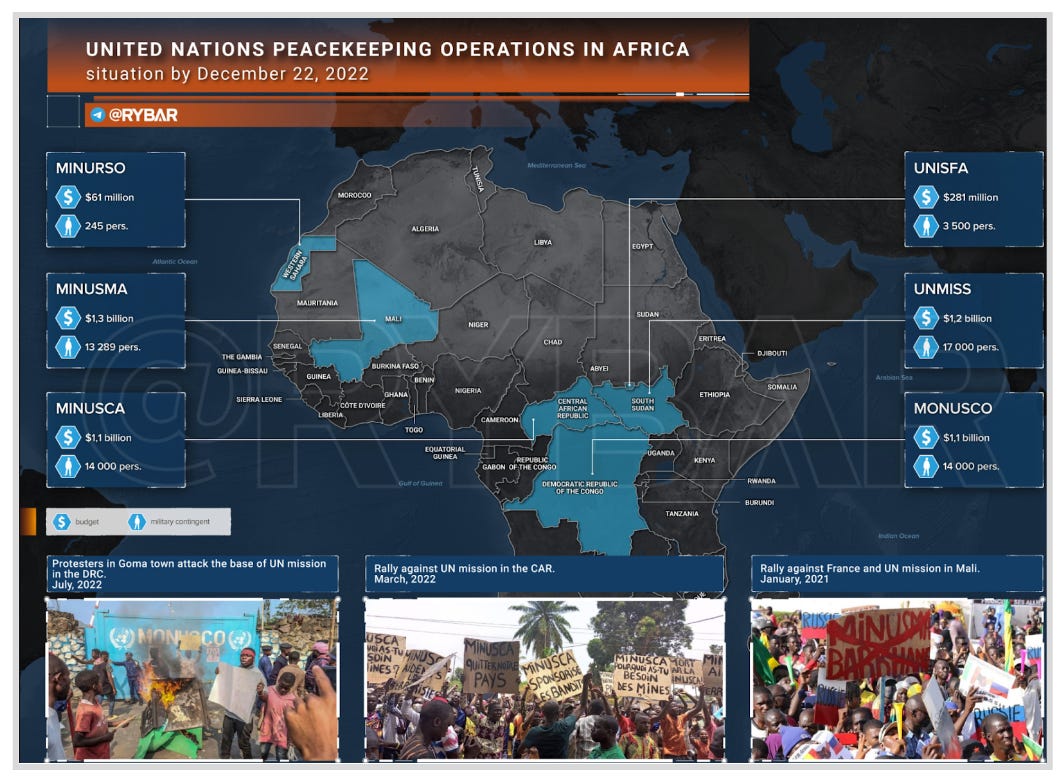
6. Criticism of UN Reporting and Operations
In addition to messaging by pro-Russian telegram channels, the Russian state-owned media outlet Sputnik Afrique also helps share narratives aligned with Russian interests while amplifying anti-UN narratives. For instance, Sputnik Afrique’s coverage of the Malian authorities’ responses to MINUSMA’s reports highlights the strategic use of official media in these campaigns.
Sputnik Afrique chastised the UN for its alleged ‘barely veiled attack’ on the Russia-Wagner partnership. The article portrayed the UN as biased and Russia as unjustly criticized.
On 24 March 2023, Sputnik Afrique’s Telegram channel posted parts of the article from its website about Malian authorities’ reaction to sections of MINUSMA’s quarterly note on Mali about the country’s military collaboration with Russia. The message received 2,700 views and 57 interactions. This message was shared across African-focused Telegram channels, including ‘Chris Yapi Canal Officiel’ and ‘FaireTesRecherches’.
The quarterly note detailed the presence of Russian military instructors in Mali, stating that some Russian actors have also indicated the presence of Wagner troops in the country. According to the Sputnik Afrique article, MINUSMA criticized the fact that foreign military personnel were fighting alongside Malian armed forces in anti-extremism operations. The article states that the Malian government took exception to MINUSMA’s criticism and reaffirmed that the presence of Russian instructors in Mali is a testament to the partnership between the two countries.
On 06 July 2023, Sputnik Africa’s Telegram channel published an interview with pro-Russian geopolitical analyst Adama Diabaté, in which he claimed that MINUSMA troops have been serving their ‘masters’ rather than Malian interests. According to Diabaté, MINUSMA has not helped the Malian army in combating terrorism in the country. The post received 3,100 views and 57 interactions.
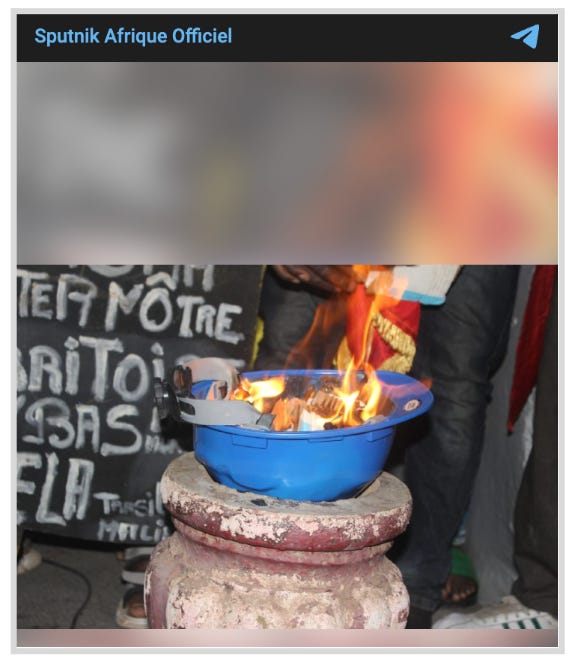
C. Techniques and Tactics
1. Telegram as a Trusted Platform
Telegram was created in 2013 by Nikolai and Pavel Durov, who founded Russia’s most popular social media platform, VKontakte (VK), in 2008. In 2014, the duo left VK allegedly because of government interference in the platform. As a result, privacy from governments was a priority for Telegram.
Telegram is popular among extremist organizations, fringe movements, and terrorist groups due to its history of not cooperating with law enforcement and its lack of moderation. It maintains a complicated network of shell companies to avoid complying with subpoenas from individual governments. The site’s privacy policy states: ‘If Telegram receives a court order that confirms you’re a terror suspect, we may disclose your IP address and phone number to the relevant authorities.’
2. Cross-Posting and Content Sharing
The disinformation networks use cross-posting and content sharing across multiple channels to increase reach. For instance, after sharing a story on its Telegram channel, Sputnik Afrique subsequently disseminates it across various African-focused Telegram channels. This tactic helps create an echo chamber, with the same narrative being seen across multiple sources, thus lending it credibility.
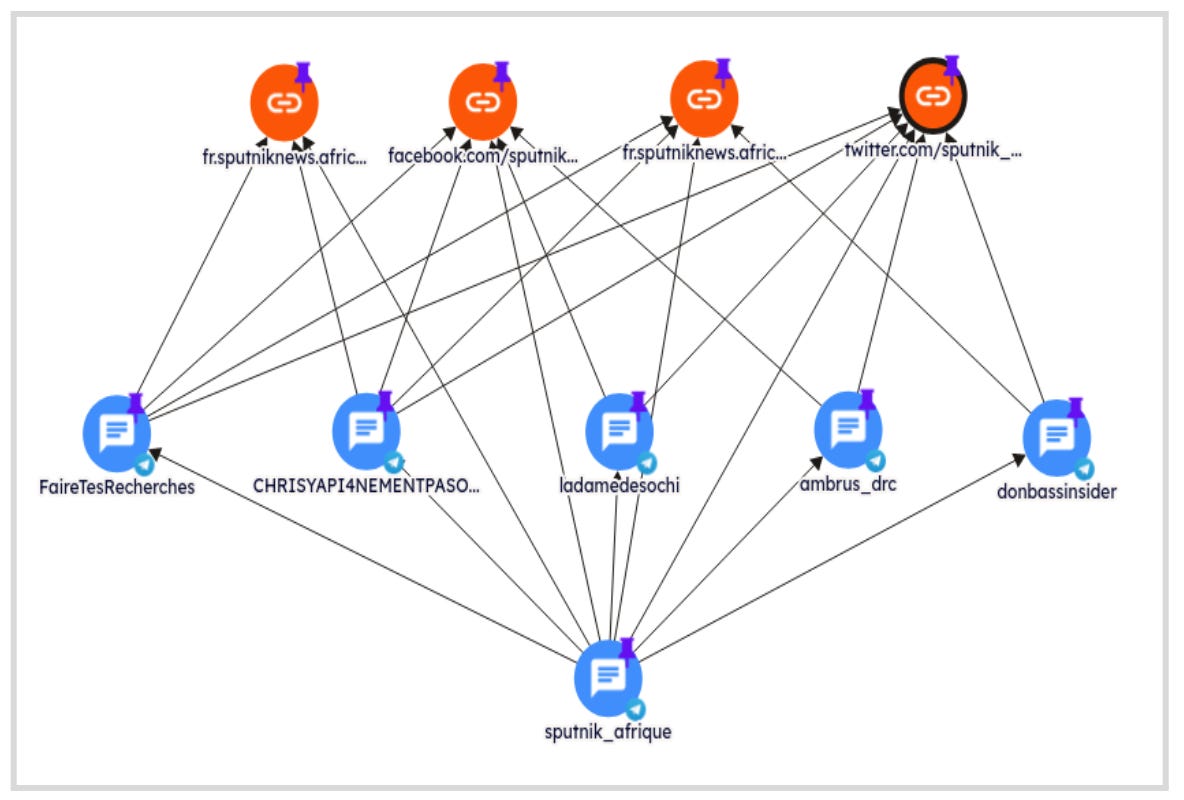
Larger channels typically experience more forwarding of their messages. For example, the Rybar channel — with almost 1.2 million subscribers — had 90,000 message forwards in January 2024. Channel size, however, is not necessarily an indicator of the number of forwards. For example, Sputnik Afrique (22,000 subscribers) had 10 times as many forwards as Le Dame de Sochi (42,000 subscribers). Forwards enable posts to reach a wider audience because the posts are viewed by the subscribers of the channel and the subscribers or members of the channels or groups that forward the message. The messages can also be forwarded to individual Telegram accounts. For instance, one of African Initiative’s most popular posts was about the arrival of Russian troops in Burkina Faso. Although the channel has about 21,000 subscribers, the post on 24 January 2024 received more than 1.6 million views and 531 interactions after being forwarded to 93 public Telegram channels and groups, as well as 3,200 individual Telegram accounts.
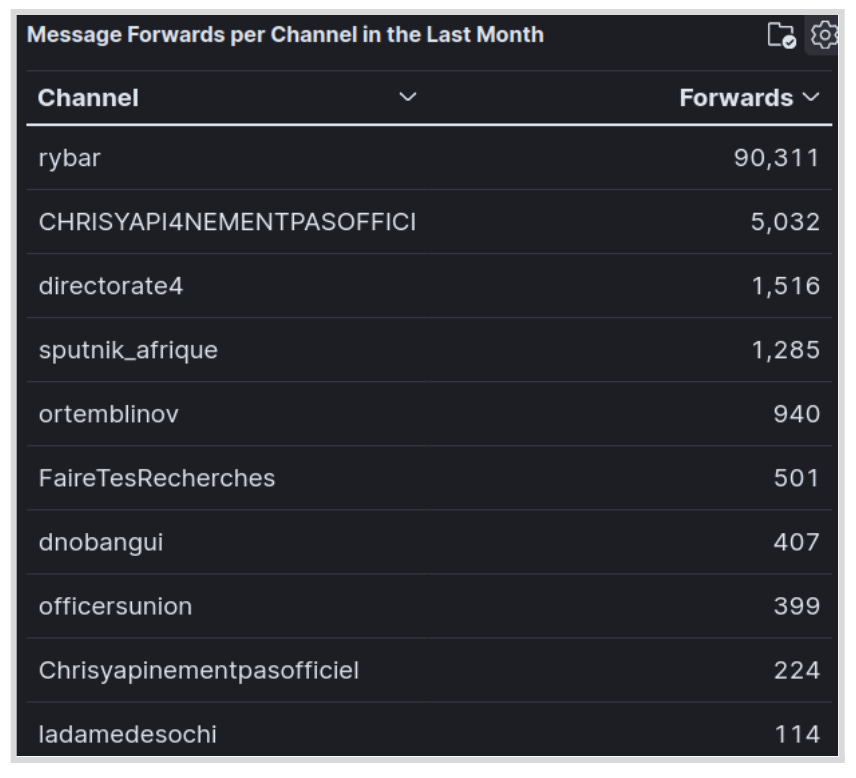
3. Strategic Timing of Posts in Relation to Current Events
Significant events such as protests, UN mission activities, or military operations often trigger these disinformation campaigns. For example, Rybar’s 01 May 2023 post about an anti-MINUSMA protest in Mali was triggered by the protest on 29 April 2023. Therefore, the post helped to amplify the event’s impact and narrative. This tactic ensures maximum relevance and engagement from the audience.
Below is a bar chart showing the number of weekly messages when querying for MINUSMA, MONUSCO, or MINUSCA. The spike at the end of June 2023 corresponds with the official dissolution of the UN peacekeeping contingent in Mali, MINUSMA, on 30 June 2023, which pro-Russian Telegram channels celebrated. At the end of August 2023, there was an increase in posts when security forces killed dozens of people in a planned anti-MONUSCO protest in the DRC.
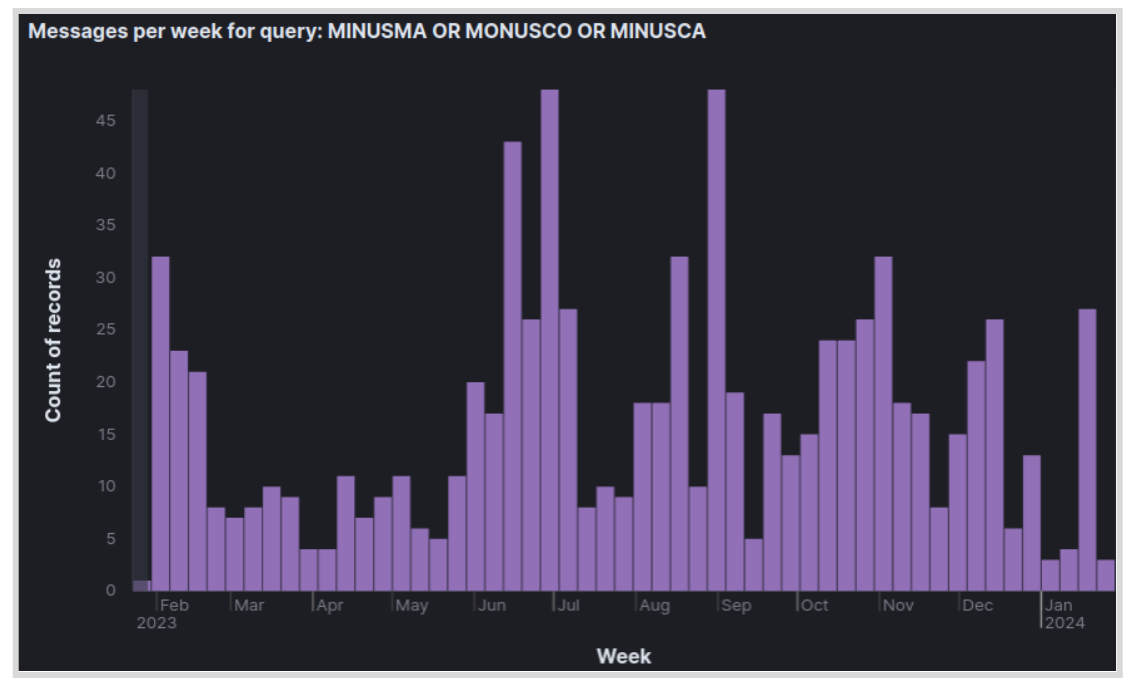
4. Use of Multimedia Content
Channels like ‘Smile and Wave’ used videos and images, such as the video of Polyansky at the UN security council, to create more engaging and shareable posts.
In the graph below, we studied multimedia content in Telegram messages and its effect on the number of reactions and forwards for a post. Posts containing videos had, on average, about 10 more reactions than posts that did not contain multimedia and almost four times the number of forwards. Interestingly, posts with photos had more forwards but fewer reactions on average than non-multimedia posts.

5. Language and Contextual Relevance
The narratives analysed were often presented in languages and contexts relevant to the intended audience, as seen in the use of specific regional references and language in posts about Mali, the DRC, and CAR. This tactic ensures that the content resonates more with the local audience and appears more credible.
Most channels targeting the region post primarily in French and not in Russian, like Sputnik Afrique’s Telegram channel. On 16 November 2023, the channel posted an interview with the vice-president of Mali’s defence commission, Fousseynou Ouattara. In it, he stated that MINUSMA was not successful in fighting terrorism because that was not its goal, suggesting the mission had ulterior motives. According to the post, Ouattara said there was a surge in terrorist activities after MINUSMA arrived in Mali. Like most other posts on Sputnik Afrique’s Telegram channel, it was in French.
Many channels also post side-by-side translations in two or more languages. For example, ‘FaireTesRecherches’ frequently posts content in French and English, particularly for more significant posts such as those about protests or terrorist attacks. The channel usually posts about global events, expressing anti-Western sentiments. It has 3,501 subscribers.
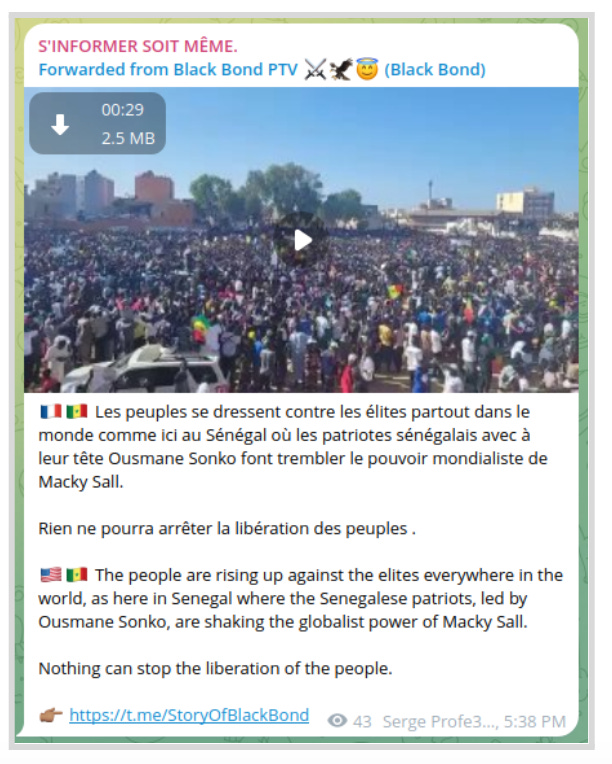
D. Conclusion
The investigation reveals a sophisticated and coordinated disinformation campaign operating across Telegram and other messaging platforms, primarily targeting the UN missions in Mali, the DRC, and CAR. These campaigns are intricately designed to undermine the credibility of UN peacekeeping efforts and promote pro-Russian and Wagner Group interests in these regions. The tactics used, such as strategic timing of posts, cross-posting between channels, and the use of multimedia content, are tailored to exploit Telegram’s unique features, ensuring broad reach and impact.
Key actors like Vasiliev and Blinov, among others, have been instrumental in driving these narratives. Their channels spread disinformation, leveraging their extensive reach and influence to shape public opinion. The narratives being shared predominantly paint the UN missions as ineffective and corrupt while framing Russian military involvement as a more viable and trustworthy alternative.
This campaign’s effectiveness is further enhanced by Telegram’s encryption, which provides a degree of anonymity and security, making it challenging to counteract these false narratives. In addition, using local languages and contexts ensures that the content resonates with the target audience, making the disinformation more credible and appealing.
The findings underscore the complexity and danger of information warfare in today’s digital age, where messaging platforms like Telegram can be weaponised to influence public sentiment and political dynamics on a large scale. This investigation highlights the need for increased vigilance and critical evaluation of information sources in conflict-affected regions and calls for a more proactive approach in countering disinformation campaigns that threaten the stability and peace efforts in these vulnerable areas.
This report was co-written by CfA senior investigation manager Allan Cheboi and CfA iLAB investigative data analysts Eliud Akwei and Dorcas Solonka. Researchers at Open Measures led initial research and findings. The report was edited and reviewed by CfA iLAB insights manager Nicholas Ibekwe, CfA iLAB copy editors Karabo Kgoleng and Theresa Mallinson, and CfA iLAB managing editor Athandiwe Saba.
Identify online harms with the Open Measures platform.
Organizations use Open Measures every day to track trends related to networks of influence, coordinated harassment campaigns, and state-backed info ops. Click here to book a demo.


